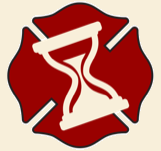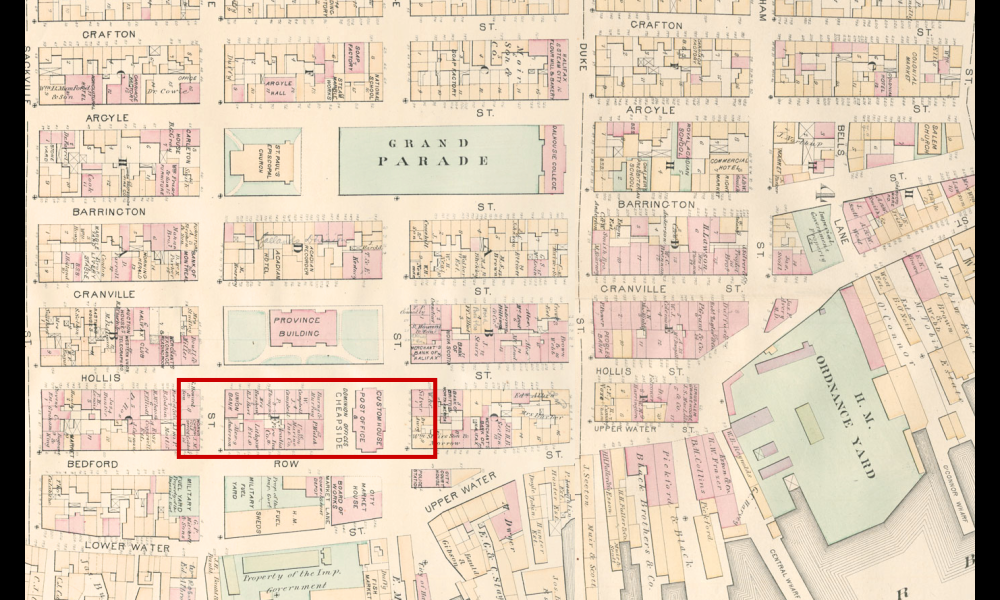Here is an account of the fire, as reported by the Acadian Recorder a few days later, on January 19, 1861, which is corroborated by the Union Engine Company minutes:
Halifax just had another of those awfull [sic] visitations by fire of which it has had the frequent misfortune, of late years to be a victim. Last Saturday evening (the 12th inst.) the engine house bell rang out the alarm of fire, which was immediately repeated by the other Church and alarm bells in town. The fire was found to be in the grocery of Mr. J. Garvie, about the middle of Hare's building, fronting on Cheapside. The shop had been closed for the night about half an hour before. The fire engines were early at the spot, but everything that was freezable was frozen stiff, some of the hose laid down are said to have proved defective, and, before any considerable jet could be brought to bear upon the fire, Garvie's shop was in a hopeless condition and the other shops, above, on each side, and in the rear, were being rapidly ignited. In half an hour's time after the alarm was given, it was obvious that the whole block known as Hare's Building must be destroyed; whilst there seemed but a small probability of saving the two adjacent blocks, lying North and South of it. A stiff, cutting breeze from the North drove the smoke and fire in an opposite direction so that the efforts of the firemen to save the North block separated from Hare's building by George Street, proved successful, although, for a time, Avery, Brown & Co's store was on fire. Hare's building, which, we believe, was the largest wooden structure in Halifax, and three storeys high with a pitched roof, burnt like a torch; and by 11 o'clock it was wrapped in flames from end to end, whilst the hardware store of Black, Brothers & Co. and an unoccupied shop of W. B. Hamilton's on the opposite side of Cheapside, were already in full blaze from the reflected heat. Long before this time, a large body of soldiers from the garrison were marched down to aid the firemen and other citizens; but all the efforts of the Fire Department, with the means at their disposal for checking fire in such great wooden piles, seemed to be little better than a waste of exertion. They produced little or no perceptible effect.
The natural presumption is that the best thing to have done at this stage of proceedings was to commence at the opposite extremity of this block, on Prince St., and raze the buildings as fast as possible in the direction from which the fire was coming. This would certainly have prevented it crossing Prince St., and it was obvious to everyone that no exertion could save any part of the block now on fire. This was not done, however; probably that the occupants of these of those buildings might have an opportunity of saving their goods — or perhaps the precedent in Seldon's case had its influence — and the flames roared on southwardly. The block in which they now were consisted altogether — with the exception of E. G. Fuller's brick store — of wooden buildings. One only of these — Lithgow's grocery — was of one storey high; most of the others were of three storeys. The reader may imagine what the fire would be in such a mass of kindling.
By 2 o'clock A. M., the fire had reached the last buildings on the block — Harrington's Grocery on the North, and the Merchants' Exchange on the South. Simultaneously with this, the Morning Chronicle building and that occupied as the Columnist office and Stewart's Saloon, on the South side of Prince Street, took fire. We suppose the shingles on the upper part of their roofs must have become charred by the shower of sparks and burning cinders which had been falling upon them for three hours. Without any other immediate cause, they both ignited with a sudden flash like a Lucifer match, at the moment, and on the extreme ridge of the roof, the snow still lying upon the lower slopes of their roofs. Consequently, both sides of Prince Street were here on fire at once. Vacant lots, which have remained thus ever since the great fire of the 1st of January 1857, separate the Columnist office from the nearest houses Southerly on Hollis Street. In consequence of this, the fire was prevented going any further in that direction. But the connection of wooden buildings, continued from the Chronicle office into Bedford Row. Geldert's house and shop on the corner, was, of course, soon on fire. Next was an office occupied by W. H. Townsend, Fish Inspector; then came a stone building, but with a wooden roof, occupied as the offices of J. P. Mott and of the Building Society. Here the conflagration was staid and this building was saved. The falling of the chimney in Geldert's house caused the most disastrous incident of the night; for a young man named Harvey was killed and several others severely injured.
We do not think the loss of property by this fire can be so great as it was by that of September 1859; but a greater number of persons have been "burnt out" of their places of business […]
[…]Scarcely anything was saved from any of the tenements in Hare's building. A considerable quantity of goods was saved from the other two blocks, however, in the damaged state usually caused by the hurry at such a time. A great loss of property also ensued from the hurried removal of effects from neighbouring houses and shops, menaced, but not destroyed, by the fire. In point of numbers, the representatives of the Law and the Press have been the greatest sufferers. No less than thirteen lawyers have been turned out of their offices on — we may say in their case, we fear — a pitiless world; whilst seven newspapers find it necessary to suspend publication for periods varying according to the amount of damage their proprietors have sustained.
The great degree of drunkenness which prevailed during the fire was a matter of general observation. We certainly never before saw so many persons "drunk and incapable" in the streets of Halifax. We suppose the coldness of the night, 14° below zero, and the facility with which strong drink could be procured at the many groceries and liquor stores that were on fire, proved a temptation which the many could not withstand. Certainly men were tumbling about and lying in the gutters in all directions; and we saw some, in Bedford Row, literally wallowing in slush — cause by the half melted snow — nearly knee deep, their hair and clothing covered with ice. We fear that many a fatal disease will date from that night. A large number of persons were frost-bitten. We are informed that some forty soldiers have been taken to the hospital.
We are sorry to have to record a long list of serious accidents. It has already been mentioned that a young man, named Harvey was killed by the falling of a chimney. P. Coleman, a journeyman printer engaged in the Chronicle office, received an unlucky blow, fracturing his skull — so we are informed — and his life is despaired of. F. Albro had a leg broken in two places. William Carey, sexton of the Granville Street Chapel, had a leg so frightfully crushed that amputation became necessary. Joseph Roles had an ankle dislocated and was badly bruised about the chest. Lawrence Murphy had both legs broken. P. Power had a leg broken. A young man named Major had, we are informed, one leg and one arm broken, his skull fractured, and one cheek laid open to the bone. The City Marshall had two of his ribs broken while assisting to arrest a man by the name of Mahar for drunkenness and disorderly conduct at the fire, and is likely to be confined to his home for some days. A young man named Morton, in the employ of James Scott, grocer, who was very active at the fire, received a blow on the head from a falling brick, which has caused concussion of the brain. He is delirious and in very precarious condition. J. McNeil, baker, very much bruised. Many others suffered injuries of a less serious character.
The damage was estimated to be in the range of £100,000.00, or about CAD$11,560,750.00. None of the firefighters were reported to be injured, but civilians wanting to help were. It would have been interesting to know what role the latter played at the fire, to find out the contributing factors behind the injuries. It was mentioned that the fire was visible as far as Middle Musquodoboit, nowadays an hour drive away.
In a subsequent article, the Acadian Recorder tore into the Union Engine and Axe Fire Companies, calling them an “irresponsible body” and making it seem like they had no coordination whatsoever. It had similar comments for Firewards and City Council. They also went after the fact that the Union Engine and Axe Fire companies elected their own members and could therefore arbitrarily exclude whoever they wanted, and they made a call for a paid fire department. The beginning of the article goes like this:
The recent disastrous conflagration suggests, with renewed force, many ideas which were put forth by, indeed by the Press of this city generally, with but few exceptions immediately after each of the great fires of 1857 and 1859. It seems obvious enough that a complete and radical reform is essential in the plans and organization for preventing and extinguishing fires.
Everybody had an opinion as to what the strategies and tactics should have been at the fire, especially the Acadian Recorder. In any case, it becomes apparent that City Council responded to the press critiques by a series of resolutions to reorganize the fire department and later on, by going after the fire companies’ right to elect their own members.


